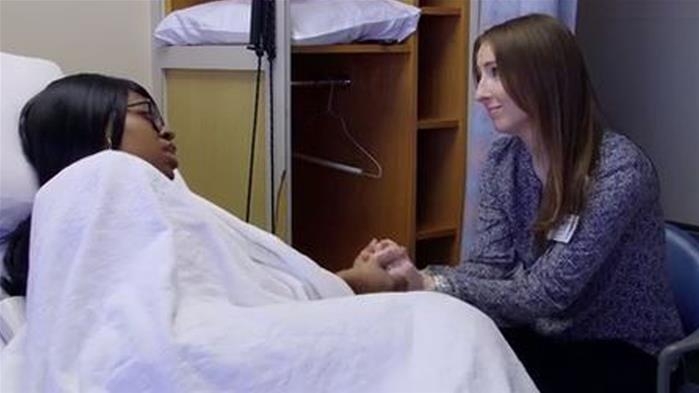The patients roll into the hospital dayroom in wheelchairs. And they bring their stories with them.
One woman had a stroke during a quadruple heart bypass. Another with blood cancer suffered a broken back and broken leg. A man who was fine just a week earlier had a stroke and is not sure what the future holds.
They are total strangers, but an instant camaraderie bubbles up with the realization that they all have something in common: They are in the hospital, fighting to make sense of the turn of events that put them there. Voices cracked with emotion as they shared what happened to them.
"I'm on another journey that I never thought I'd be on,” said Judy Poplin, who suffered the stroke during heart surgery. She’s having a hard day and her legs are difficult to control. "Just because you're a little broken,” she told the others, “doesn’t mean you’re not worth anything.” She gazed around the room, and then added: "It’s been a pleasure meeting all of you.”
They may not realize it, but this is part of their recovery, which at the moment is in the hands of Jessica Bruno, a licensed therapist at Novant Health Forsyth Medical Center in Winston-Salem, North Carolina. Her job is to help patients help themselves when they land in the hospital with a serious illness.
“We all have these coping tools: our hobbies, our loved ones and the little things that make us happy and make our life worth living,” she said. “And so when you land in the hospital for days or weeks on end, all of a sudden you don't have access to all of these things. We start thinking, ‘What's my life going to be like? When am I going to get better? How am I going to pay these medical bills?’”
And that’s where Bruno, 30, steps in. In group sessions and one-on-one check-ins, she arms patients with strategies to help them stay calm, focus, sleep better and concentrate on the task at hand, leaning hard into their physical therapy and rehabilitation so they can get better, go home, and get their lives back. “People can be incredibly resilient in rehab,” she said. “You truly get out what you put in.”
A ‘lightbulb’ moment
Bruno had been planning for a career in public relations when she graduated with a degree in marketing in 2009. But she was entering the field at the height of the Great Recession, which was wiping out communications-related jobs by the thousands. She spent the next four years shooting school portraits for a national company and noticed that people were quick to share their life stories with her. “This lightbulb went off,” Bruno said, and she went back to school to get a master’s degree in marriage and family therapy.
She landed at Forsyth Medical Center after working as a certified nursing assistant in the hospital’s behavioral health unit. Most therapists don’t have any nursing experience, and her future boss was impressed enough to give her a job.
“She represents what our entire program is all about: working on the whole individual,” said Randy Harper, director of therapy operations at Novant Health Rehabilitation Hospital. “Just being there, and being able to listen is a huge part of what many people need. She offers encouragement and connects them with others. Often, that’s how they get the motivation they need” to embrace recovery.
By her own description, Bruno’s not there to help with emotional breakthroughs like some therapists. “My job is to help patients help themselves.” In her group sessions, she said: "You suddenly realize, 'Whoa. I'm not alone. And No. 2, you realize that someone always has it worse than you."
Today, she works with patients at Novant Health Rehabilitation Hospital. In October, she’ll move to the new Novant Health Rehabilitation Hospital that Novant Health is building in collaboration with Encompass Health. The new freestanding inpatient rehabilitation hospital will feature 68 private patient rooms, spacious therapy gym, courtyard, dining and dayroom areas.
‘It’s not over yet’
As patients took turns telling their stories at a recent session, Bruno pointed out that several appear to be instinctively working to be positive, even as they discuss fighting off sadness or breakdowns. But she doesn’t minimize the mountains some have to climb in the recovery. “Even though we don’t understand why this happened, and that it’s all so unfair … we’re still here,” Bruno said. “Life is a gift and it’s not over yet.”
And on this day, the room gets it. Amy Madrigal, the cancer patient with the broken bones, explains how she can’t wait to leave the hospital. “I want to go home and clean my house!” she says, raising her arms to the heavens in mock exasperation. She laughs and wonders aloud, “Who would have ever thought we’d look forward to cleaning the house?”
The room laughs with her.







